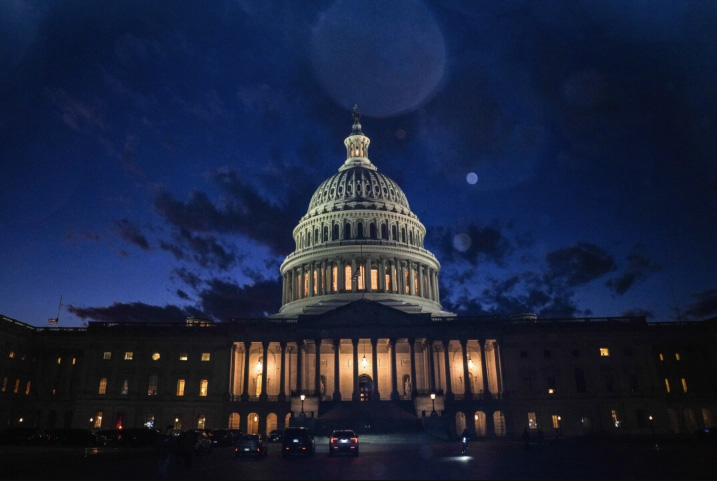Copyright Santa Clarita Valley Signal

By Joseph Lord and Nathan Worcester Contributing Writers WASHINGTON — The House of Representatives on Wednesday passed a legislative package to end the longest government shutdown in U.S. history. In a 222-209 vote, the House approved the measure around 8:20 p.m. ET. Several Democrats, including Reps. Jared Golden, D-Maine, Adam Gray, D-Calif., Don Davis, D-N.C., Henry Cuellar, D-Texas, Tom Suozzi, D-N.Y., and Marie Gluesenkamp-Perez, D-Wash., voted for the package. Two Republicans, Reps. Thomas Massie, R-Ky., and Greg Steube, R-Fla., voted against the bill. The same measure was passed by the Senate on Monday with the backing of eight members of the Senate Democratic conference. The bill heads to President Donald Trump’s desk. He was due to sign it at 9:45 p.m. ET, which would officially reopen the government after 43 days of closure. Aside from punting government funding to Jan. 30, 2026, and thereby ending the 43-day shutdown, the measure fully funds three sectors of government, including the Department of Agriculture, the Department of Veterans Affairs, and the Legislative Branch, through Sept. 30, 2026. It also includes full-year funding for the Supplemental Nutrition Assistance Program and the subsidiary Women, Infants, and Children program. Funding for these programs has been delayed by the shutdown. Senate Payout Controversy Ahead of the vote, many Republicans have joined Democrats in condemning a controversial provision of the bill that allows senators whose phone records were pulled without their knowledge to sue the government. Specifically, the provision, wrapped into the legislative branch funding bill, would allow senators to sue the government for at least $500,000 when federal law enforcement searches their phone records without notifying them, including in cases where a judge authorized the search. That measure unnerved many House Republicans, prompting some to suggest they’re prepared to defect over the issue — defections that House Speaker Mike Johnson, R-La., could not afford. After his conference’s frustration with the measure became clear, Johnson promised members that the lower chamber would fast-track standalone legislation to reverse the Senate provision. The provision at issue relates to subpoenas issued under President Joe Biden, which were related to the investigation into efforts to challenge congressional certification of Biden’s 2020 election victory. The provision was criticized by Republicans including Rep. Morgan Griffith, R-Va., who said during a House Rules Committee hearing on the package that he agreed with Democrats’ skepticism about that portion of the text. Rep. John Rose, R-Tenn., also spoke against the Senate provision during a speech on the House floor. He agreed with many other Republicans that Biden’s Department of Justice had overreached in its investigations into the 2020 election and Jan. 6, 2021, Capitol breach, but said the measure was nevertheless inappropriate. “No elected official should profit from the political calculations of left-wing bureaucrats and judges,” Rose said, adding that it is “shameful” to ask American taxpayers to finance the measure. Speaking to reporters on Wednesday, Johnson said that he was “surprised” by the Senate bill provision, noting that many in the House “have a strong opinion about it.” Thin Margins Although most Republicans are eager to end the shutdown — which has caused flight cancellations and slowdowns, delays in paying for essential services, and a host of other challenges — the Senate provision has stoked division among Republicans. Johnson can scarcely afford that division as he faces his thinnest margins this Congress after the swearing-in of Rep. Adelita Grijalva, D-Ariz., whose swearing-in was delayed due to the government shutdown. With Grijalva joining the lower chamber, Democrats now hold 214 seats to Republicans’ 219. That means that Johnson can’t afford more than two defections on a party-line vote. One Republican, Rep. Greg Steube, R-Fla., announced that he would be opposing the measure, expressing skepticism that the Senate would even consider Johnson’s proposal. “The Senate will never take up your ‘standalone’ bill. This is precisely why you shouldn’t let the Senate jam the House,” Steube wrote in a post on X. The Wednesday vote series on the package marks the first time that the full House has been in session on Capitol Hill for official business in eight weeks. Johnson had adjourned the session following the House’s passage of a stopgap funding bill, a move that Democrats claim was intended to put pressure on the Senate. January Shutdown Possible: DeLauro Health care has been the primary issue that led to and sustained the shutdown. According to House Appropriations Committee Chairwoman Rosa DeLauro, D-Conn., the same issue could drive another shutdown in January. “I’m concerned,” DeLauro said when asked about the prospect. “On Jan. 30, we could find ourselves in the same position. Keep in mind, we got nine more appropriations.” Democrats have been calling for a one-year extension of tax subsidies for Affordable Care Act policies, which are due to expire at the end of this year. Some experts have warned that the lapsing of these subsidies could cause drastic increases in the premiums for ACA policies. Several Democrats on the Rules panel and later in remarks on the House floor reported personally hearing from their constituents who are facing premium increases of several thousand dollars next year. House Minority Leader Hakeem Jeffries, D-N.Y., on Tuesday evening called for an amendment to extend ACA subsidies by three years. The measure failed, as did other efforts by Democrats to attach ACA subsidy extensions to the package. The Senate passed the funding bill on Monday, with seven Democrats and one independent joining all Republicans but one. Jackson Richman contributed to this report.



